Balbharti Maharashtra State Board Class 11 Sociology Important Questions Chapter 2 Contribution of Western and Indian Sociologists Important Questions and Answers.
Maharashtra State Board 11th Sociology Important Questions Chapter 2 Contribution of Western and Indian Sociologists
Choose the correct alternative and complete the statements.
Question 1.
At the age of 14 expressed the need for ‘reconstruction of society.’
(Karl Marx / Auguste Comte / Emile Durkheim)
Answer:
Auguste Comte
Question 2.
Auguste Comte described sociology with its ‘static’ and ………………….. aspects.
(stable / rigid / dynamic)
Answer:
dynamic
![]()
Question 3.
According to …………………, human knowledge passes through three stages of evolution.
(Iravati Karve / Auguste Comte / Karl Marx)
Answer:
Auguste Comte
Question 4.
The ‘Theory of suicide’ is developed by …………………..
(Emile Durkheim / Karl Marx / Dr. M. N. Srinivas)
Answer:
Emile Durkheim
Question 5.
When the repressive feeling is created due to extreme control of society ……………….. suicide takes place due to extreme control of society.
(fatalistic / anomic / egoistic)
Answer:
fatalistic
Question 6.
……………….. suicide takes place in situation where one is unable to cope with circumstances, cropped up suddenly.
(Fatalistic / Altruistic / Anomic)
Answer:
Anomic
Question 7.
The persons who are concerned with their own interests and have nothing to do with other member of the society, commit …………….. suicide.
(egoistic / anomic / fatalistic)
Answer:
egoistic
Question 8.
………………… is also known as the architect of communism.
(Iravati Karve / Auguste Comte / Karl Marx)
Answer:
Karl Marx
Question 9.
According to Marx, it is the ……………….. factor that formed the basis of class.
(political / economical / social)
Answer:
economical
Question 10.
The tendency towards the radical polarization of classes is inherent in ………………. society.
(capitalist / democratic / modern)
Answer:
capitalist
Question 11.
Capitalists accumulate profit through the ……………….. of labour.
(accumulation / manipulation / exploitation)
Answer:
exploitation
![]()
Question 12.
According to Marx. ………………… is the result of exploitation and not of scarcity.
(poverty / unemployment / beggary)
Answer:
poverty
Question 13.
……………… is the Father of Indian Sociology.
(Dr. G. S. Ghurye / Dr. Iravati Karve / Dr. M. N. Srinivas)
Answer:
Dr. G. S. Ghurye
Question 14.
………………. formed the ‘Indian Sociological Society’ in 1952.
(Dr. M. N. Srinivas / B. K. Sarkar / Dr. G. S. Ghurye)
Answer:
Dr. G. S. Ghurye
Question 15.
Dr. G. S. Ghurye wrote a book ………………… in 1932.
(Caste and Race in India / Kinship Organisation in India / Positive Philosophy)
Answer:
Caste and Race in India
Question 16.
The concept of ‘Dominant Caste’ is introduced by …………………
(Dr. Iravati Karve / Dr. G. S. Ghurye, / Dr. M. N. Srinivas)
Answer:
Dr. M. N. Srinivas
Question 17.
The book ‘Kinship Organisation in India’ is published in 1953 by ………………..
(Dr. Iravati Karve / Dr. G. S. Ghurye / B. M. Seal)
Answer:
Dr. Iravati Karve
Correct the incorrect pair.
Question 1.
(a) Durkheim – Theory of Suicide
(b) Karl Marx – Theory of Class Conflict
(c) Auguste Comte – The Study of Race and Racism
(d) Abdul Rahman Ibn – Khaldun – Study of social institutions and their interrelationships
Answer:
(c) Auguste Comte – Theory of ‘Law of Three Stages’
Question 2.
(a) Positive Philosophy – Auguste Comte
(b) Caste and Race in India – Dr. M. N. Srinivas
(c) Kinship Organisation in India – Dr. Iravati Karve
(d) The Philadelphia Negro – William Du Bois
Answer:
(b) Caste and Race in India – Dr. G. S. Ghurye
![]()
Question 3.
(a) Le Suicide – Auguste Comte
(b) Communist Manifesto – Karl Marx
(c) Sociological Bulletin – G.S. Ghurye
(d) Kinship Organisation in India – Iravati Karve
Answer:
(a) Le Suicide – Durkheim
Question 4.
(a) Social isolation – Altruistic suicide
(b) Normlessness – Anomic suicide
(c) Value oriented – Altruistic suicide
(d) Repressive feeling – Fatalistic suicide
Answer:
(a) Social isolation – Egoistic suicide
Question 5.
(a) Abolition of private property – Communist society
(b) Economic exploitation – Alienation
(c) Accumulation of profits – Surplus values
(d) Workers poverty – Antagonism
Answer:
(d) Workers poverty – Pauperization
Identify the appropriate term from the given options.
(Dr. G. S. Ghurye, Dr. Iravati Karve, Altruistic suicide, Dominant caste)
Question 1.
Marx argues that classes will become hostile towards each other.
Answer:
Polarization
Question 2.
The Indian sociologist who coined the term westernisation.
Answer:
M. N. Srinivas
Question 3.
He started an independent Department of Sociology in the University of Bombay.
Answer:
Dr. G. S. Ghurye
Question 4.
Her concept of Kinship relations in India in basically a socio-cultural concept.
Answer:
Dr. Iravati Karve
Question 5.
This type of suicide is value-oriented.
Answer:
Altruistic suicide
Question 6.
Enjoyment of maximum economical and political power.
Answer:
Dominant caste
![]()
Question 7.
According to Marx, poverty is the result of exploitation.
Answer:
Pauperization
Question 8.
The theory of class conflict.
Answer:
Karl Marx
Question 9.
It is result of economic exploitation and inhuman conditions.
Answer:
Alienation
Question 10.
In this stage one seeks to establish laws which govern social life.
Answer:
Positive stage
Correct the underlined words and complete the sentence.
Question 1.
Some writers honour Dr. Iravati Karve as the first female sociologist.
Answer:
Some writers honour Harriet Martineau as the first female sociologist.
Question 2.
Emile Durkheim was the first black man to receive a Ph.D. from Harvard University.
Answer:
William Du Bois was the first black man to receive a Ph.D. from Harvard University.
Question 3.
Dr. Iravati Karve introduced the concept of Sanskritisation.
Answer:
Dr. M.N. Srinivas introduced the concept of Sanskritisation.
Question 4.
Dominant caste is primarily socio-cultural concept related to factors of family, caste and language in India.
Answer:
Kinship is primarily socio-cultural concept related to factors of family, caste and language in India.
![]()
Question 5.
According to Marx, accumulation of Profit through the exploitation of labour is polarization.
Answer:
According to Marx, accumulation of Profit through the exploitation of labour is surplus value.
Question 6.
Reason and examination were basic planks of knowledge at Metaphysical stage.
Answer:
Reason and examination were basic planks of knowledge at Positive/Scientific stage.
Write suitable examples of given concepts and justify your answer.
Question 1.
Egoistic suicide.
Answer:
Example: It is committed by people who become introvert and have less desires to live in the company of others, suicide rates are higher for those widowed, single and divorced.
Egoistic suicide is when an individual finds no reason to exist in life such people have nothing to do with other members of the society. Such people are socially isolated and they think that they have no place in society.
Question 2.
Dominant caste.
Answer:
Example: Marathas in Maharashtra, are the dominant caste, landowners and cultivators that make up about 50% of the population, Reddys and Kammas in Andhra Pradesh.
1. Dominant caste is a caste large in member and exercises more economical, social and political privileges over other people.
2. In Maharashtra, Marathas are large in number and play a very important role as far as social, economical and political policies are concerned.
3. Attributes or determinants of dominant caste are as follows:
- Sizeable amount of arable land locally available.
- Strength of numbers.
- High place in the local hierarchy.
- Western education.
Question 3.
Theological stage.
Answer:
Example: For example, ancient people actually believed that planets were God. This is a stage in which people have faith on supernatural power and considered God as a supreme authority. During ancient period; people of India had blind faith on many things, were following various evil practices etc. According to them God was the highest, authority and everything took place as per His wishes.
Question 4.
Anomic suicide.
Answer:
Example: In the Indian context, the farmers’ suicides fall under anomic suicide. Because of economic instability farmers tend to commit suicide.
Anomie is a condition of normlessness, a moral vacuum, the suspension of rules, a state sometimes referred to as deregulation. This type of suicide takes place in situations where one is not able to cope with circumstances which have cropped up suddenly.
![]()
Question 5.
Altruistic suicide.
Answer:
Example: Sati committed by Indian women in the past or Hara-kiri committed by Japanese. Here an individual commits suicide with the object of doing well for others. This type of suicide is value- oriented. An individual commits suicide due to extreme loyalty to one’s group and readiness to die.
Question 6.
Fatalistic suicide.
Answer:
Example: A prisoner, commits suicide due to oppressed feelings of the prison system, (or) A terminally ill patient commits suicide.
Fatalistic suicide takes place, when the repressive feelings is created due to extreme control of society.
Write short notes.
Question 1.
The Development of Sociology
Answer:
- The foundations of sociology were laid down by Auguste Comte and Emile Durkheim in France.
- The legacy of sociology was later on continued in other countries in Europe and the western world. Sociology has also developed in India.
- Sociologist like Auguste Comte, Emile Durkheim and Karl Marx from the west and G. S. Ghurye, M. N. Srinivas and Iravati Karve have worked on specific areas within the broad scope of Sociology as a discipline.
- Many of them have developed specific concepts and developed theories through which they explain human social behaviour.
Question 2.
Contribution of Dr. M. N. Srinivas.
Answer:
1. Dr. M. N. Srinivas completed his education in Mysore and joined the Department of Sociology in Mumbai University. He was a student of Dr. G. S. Ghurye.
2. Different concepts like, Brahminisation, Sanskristisation, Westernisation and Secularisation, Dominant caste, etc., were introduced by him.
3. According to him each caste in India differ from the other as far as strength and influences are concerned. Some castes enjoy higher privileges. In this respect he developed the concept of ‘Dominant Caste’. He prescribed different determinants of dominant cast. On the basis of these attributes and determinants, some caste in India are considered as ‘Dominant Caste’.
4. Examples of dominant castes given by Dr. Srinivas are:
- Lingayats and Okkaligas in Karnataka
- Reddys and Kammas in Andhra Pradesh.
![]()
Question 3.
Contribution of Dr. Iravati Karve to Indian sociology.
Answer:
1. Dr. Iravati Karve has immense contributors in sociology and Anthropology. She has done pioneering work in her book “Kinship organisation in India” published in 1953. In this book, she presents a micro analysis of the major kinship systems in India.
2. The book gives us a list of kinship terms in major Indian languages, their linguistic content, corresponding behaviour and attitudes rules of descent and inheritance and patterns of marriage and family.
3. Kinship is primarily a socio-cultural concept and subsequently it is related to factors of family, caste and language in India.
4. She has presented kinship organisation on the basis of geographical regions – Northern, Central, Southern and Eastern, and linguistic regions like Indo-European and Dravidian kinship is a primarily socio-cultural concept and subsequently it is related to factors of family, caste and languages in India.
Question 4.
Contribution of Karl Marx.
Answer:
1. Karl Marx, is also known as the architect of Communism.
2. The Theory of ‘class conflict’ is central to Marxian thought. In his ‘Communist Manifesto’ Marx has said that, at every stage in history, there is a war between the classes.
3. According to Marx, ‘it is the economic factor that forms the basis of class’.
4. Marx’s analysis of class conflict in capitalist society is as following:
- The importance of property
- Polarization of classes
- Surplus value
- Alienation
- Pauperization
- Class solidarity and antagonism
- Revolution
- Dictatorship of proletariat
- Emergence of the communist society
Question 5.
Contribution of Harriet Martineau.
Answer:
- Some writers honour Martineau as the first female sociologist.
- Martineau introduced Comte to the English-speaking world by translating his book written in French to English, as ‘The Positive Philosophy of Auguste Comte.
- According to Martineau, “When one studies a society, one must focus on all its aspects which includes political, religious, and social institutions”
- She was the first sociologist to study issues such as marriage, children, religious life, and race relations. She believed that comprehensive social analysis was crucial to understand women’s secondary status in the society.
Question 6.
Hinduisation of the tribes.
Answer:
- Ghurye referred to the long process of Hinduisation of the tribes from different parts of India.
- Tribal deities like Ganesh, Kali, Shiva were getting equal space in Hinduism with Aryan deities like, Indra, Vishnu and Brahma for establishing synthesis between multiple cultures present in Indian society.
- As a result the tribes of India considered Hindu society and its cultural tradition, a new home for them, referred as Hinduisation of the tribes by Ghurye.
- Many tribal leaders like Tana Bhagat, Vishnu Bhagat, Kabir Panthi and others successfully carried Hindu cultural attributes to tribal life.
![]()
Complete the concept maps.
Question 1.
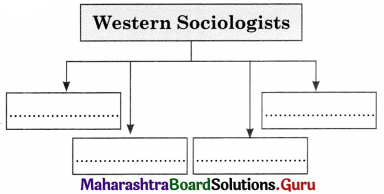
Answer:
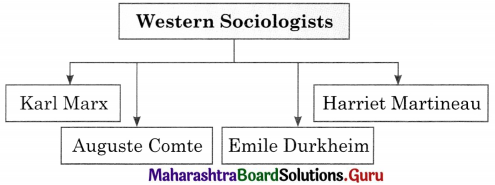
Question 2.

Answer:

Question 3.
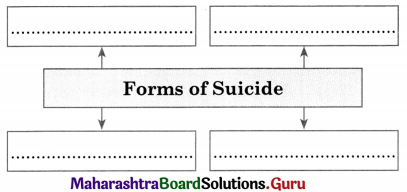
Answer:
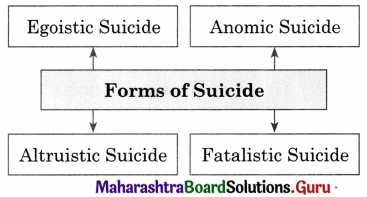
Question 4.

Answer:

Question 5.
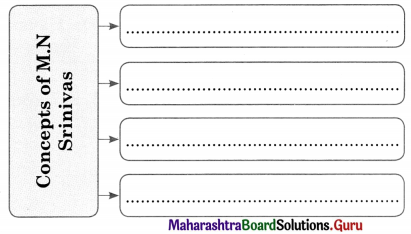
Answer:
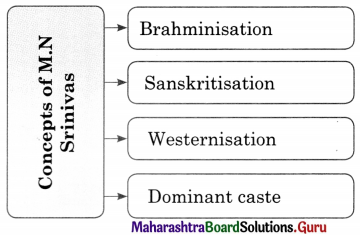
Question 6.

Answer:

![]()
Question 7.

Answer:

State whether the following statements are true or false with reasons.
Question 1.
Auguste Comte formulated the theories of‘Law of Three Stages’.
Answer:
This statement is True.
- According to Comte every individual develops as per his stages of development in childhood, in adolescence and in adulthood.
- The evolution of human mind takes place along with the evolution of the individual mind.
- Human knowledge passes through these three stages of evolution, theological stage Comte is of the view that in the first stage, ideas and views were influenced by spiritual and supernatural factors, metaphysical stage. In this stage, explanations based on faith in supernatural beings were replaced by those based on abstract power, positive stage this is an improved and scientific form of human thinking.
- Comte wanted Sociology to develop through these stages. Hence, Auguste Comte formulated the theories of ‘Law of Three Stages’.
Question 2.
Sociology is a western phenomenon.
Answer:
This statement is False.
- Though there is a tendency to think of sociology as a western phenomenon, but scholars like Abdul Rahman Ibn-Khaldun were doing Sociology long ago in different parts of the world.
- Abdul Rahman Ibn-Khaldun was born in Tunis in North Africa and was committed to the scientific study of society, empirical research and the search for the causes of social phenomena.
- He devoted attention to various social institutions and their interrelationships. He was interested in comparing primitive and modern societies.
Give your personal response.
Question 1.
Do you think farmer’s suicide is a burning issue and has emerged as a social problem? Give reasons for your response?
Answer:
Yes, farmers suicide is a burning issue and a social problem. Heavy indebtedness, irregular monsoon, rising cost of cultivation are various reasons that have led to a series of suicides committed by farmers. The action of killing oneself deliberately is suicide.
When an individual becomes unstable and enters in the state of dilemma and commits suicide it is an anomic suicide. In the Indian context the farmers suicides fall under the type of anomic suicide. Because of economic instability marginal farmers tend to commit suicide.
![]()
Answer the following in detail (About 150-200 words).
Question 1.
Bring out the contribution of any two sociologist and relate it to Indian society.
Answer:
1. Dr. G. S. Ghurye-Govind Sadashiv Ghurye is known as the ‘Father of Indian Sociology’, Ghurye’s work on tribes were general as well as specific. In his work on Scheduled Tribes, he dealt with the historical, administrative and social dimensions of Indian tribes. He also wrote on specific tribes such as the Mahadev Kolis in Maharashtra. Ghurye referred to the long process of Hinduization of the tribes from different parts of India which helped them to assimilate themselves within the folds of Hindu society. His book, ‘Caste and Race in India’ which was published in 1932 is historical, anthropological and sociological perspectives to understand caste and kinship system in India. Ghurye regards endogamy as a principal feature of caste.
2. Dr. Iravati Karve- has done pioneering work in her book ‘Kinship Organization in India’, published in 1953.The book on Kinship attempts to present a comparative picture of Kinship organisation in different parts of India. The book gives us a list of kinship terms in major Indian languages, their linguistic content, corresponding behaviour and attitudes, rules of descent and inheritance and patterns of marriage and family. Kinship is primarily a socio-cultural Iravati concept and related to factors of family, caste and language in India.